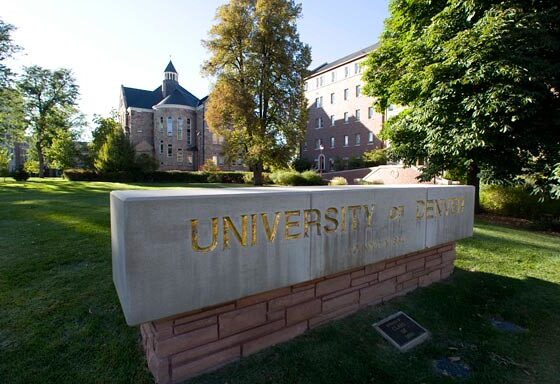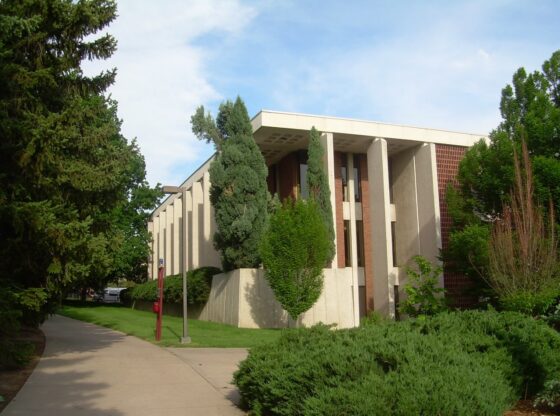The Sturm College of Law moved up in the U.S. News & World Report rankings for the third consecutive year, coming in at No. 64 in the 2013 compilation of the country’s best law schools, which was released March 12. Four of Denver Law’s specialty programs were also ranked in the top 20 nationally.
Up five places from last year’s ranking of No. 69, Denver Law tied with Pennsylvania State University, Seton Hall University and University of New Mexico. Yale University, Harvard University and Stanford University topped the list.
“U.S. News measures some things that are tremendously important,” said Martin Katz, dean of Sturm College of Law. “They measure the rate of employment of graduates, the bar passage rate and student-faculty ratios. Measures like that are extremely important and are terrific measures of quality. They also, however, measure the number of books in your library. In 2013, this is not a particularly good measure of a law school.
“We focus on moving the indicators that matter to us. We are not trying to increase the number of books in our library, but we are trying to decrease the student-faculty ratio, and we’ve done a great job of that. We are below the 10-1 ratio, which puts us in elite company and helps us with the level of education we are trying to provide our students.”
In addition to Sturm College of Law being ranked No. 64 overall, several of Denver Law’s specialty programs received recognition. The clinical training program ranked No. 15 in the country, while the environmental and natural resources program came in at No. 17. The trial advocacy program and the legal writing program ranked No. 9 and No. 11, respectively; Denver Law’s part-time law degree program finished at No. 12 in the nation.
Katz, who took over as interim dean in July of 2009, said he immediately began working on a strategic planning process to improve the law school and that has been a major driving force behind its steady climb in the rankings.
Since 2008, Sturm College of Law has moved up 24 spots from No. 88, including a 16-place climb since 2010. According to Katz, this kind of sustained rise in the U.S. News rankings is rare.
“It [the strategic planning process] was very faculty-driven; it wasn’t a top-down plan,” said Katz. “This gave us a great deal of buy-in and support. Things happen when the faculty is excited to make them happen. When I took over as permanent dean in February of 2010, there was a very clear mandate to implement this plan.”
According to Katz, there are two major areas of the strategic plan: a specialization initiative and a modern learning initiative. The specialization initiative picks five areas to focus on and includes the environmental and natural resources program, international law, employment law, constitutional rights and remedies and business and commercial law. Students may choose to specialize their degrees in any one of these areas.
“We picked these five specific areas to focus on instead of being all things to all people,” said Katz. “This allows us to focus on being truly excellent in those areas and allows students to build their specialties.”
The second aspect of the strategic plan is the modern learning initiative, which focuses on experiential learning. Students gain real-life experience through clinics, in which they represent clients in real cases under faculty supervision; externships, in which they work with community lawyers on their cases; and course simulations, in which they simulate cases under the supervision of faculty and practitioners.
“We are one of the nation’s leaders in experiential education,” said Katz. “The best way to learn how to be a lawyer is to spend time in the shoes of a lawyer with great teaching and great mentoring. What we are seeing in the peer assessment score [in U.S. News’ rankings] is that people are starting to see and understand the quality of our program.”
According to Katz, the university has made large investments in the Sturm College of Law as a direct result of this strategic plan, which has allowed Denver Law to shrink its class sizes by 20 percent, increase the number of faculty and substantially increase the amount of financial aid available to students.
U.S. News’ ranking system judges the 194 law schools fully accredited by the American Bar Association based on 12 measures of quality, including median LSAT score, selectivity, bar passage rate and student-faculty ratio, among others. Specialty rankings were based on a voting system among legal educators currently teaching in the field.
“The way to think about U.S. News rankings is that you don’t place undue importance on them, but that they are nonetheless important,” said Katz. “Students who are thinking about coming here, faculty who we are recruiting and employers who are hiring from the school all look at rankings, so we want to pay attention to them.”











